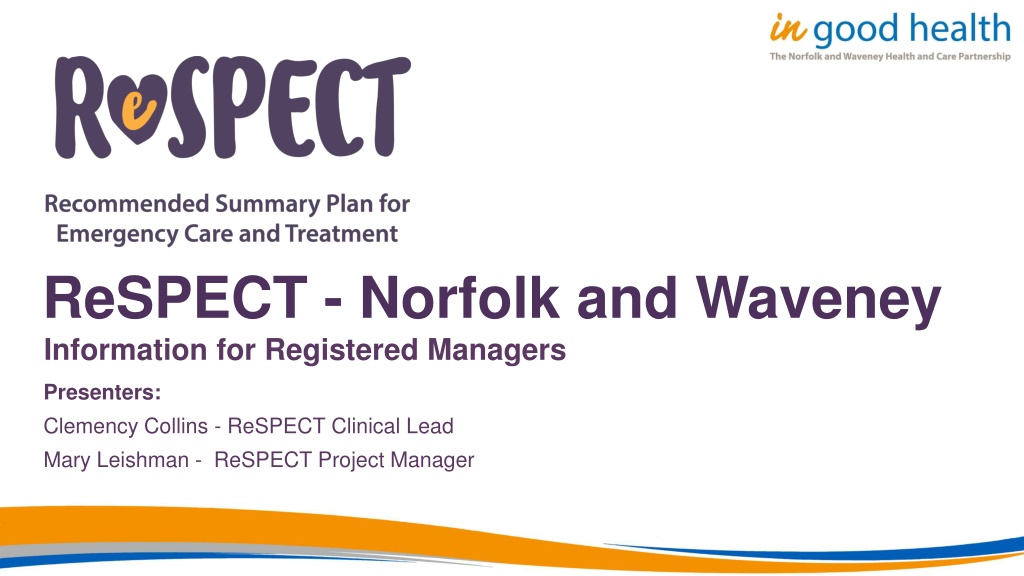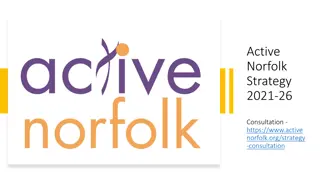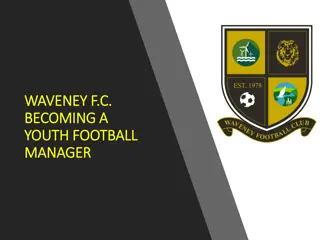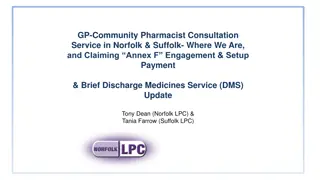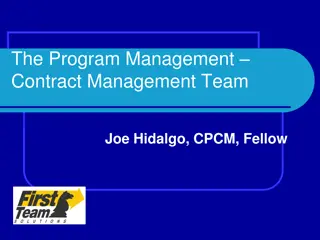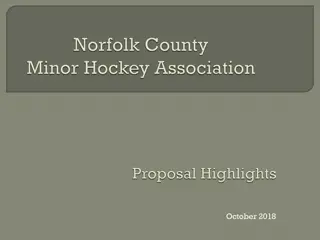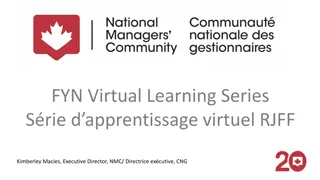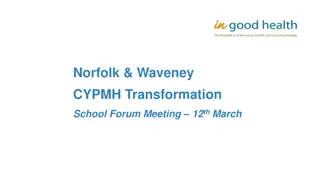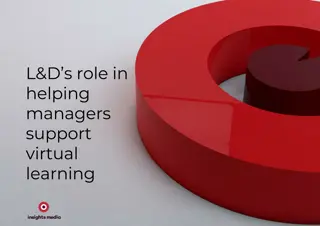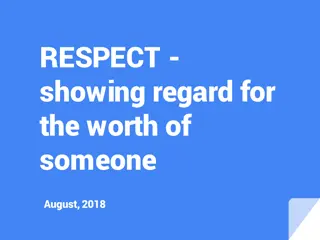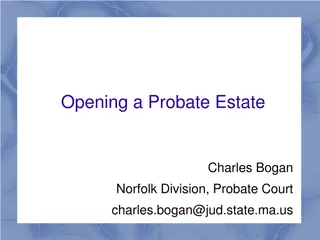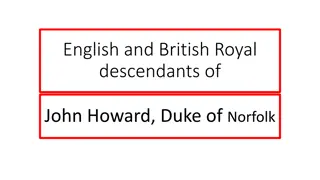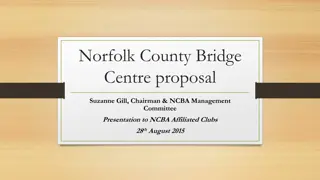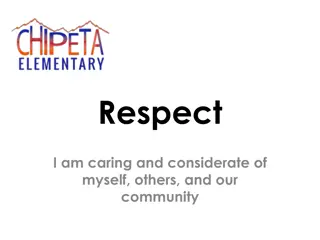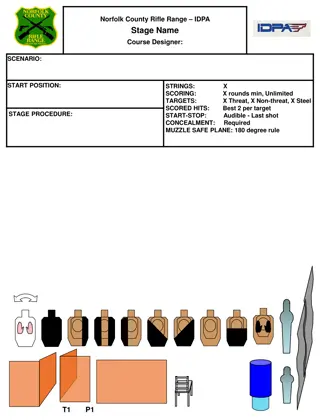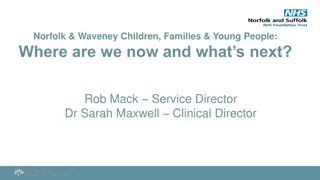Understanding ReSPECT: Norfolk and Waveney Information for Registered Managers
ReSPECT is a process that generates personalized recommendations for clinical care during emergencies when a person cannot make decisions. It focuses on respecting patient preferences and clinical judgment, including decisions on CPR. It is intended for individuals with complex health needs, those nearing the end of life, at risk of sudden deterioration or cardiac arrest, and those with strong treatment preferences. ReSPECT involves conversations between patients and healthcare professionals to ensure immediate access to agreed recommendations in various care settings. The process is not exclusive to decisions on CPR and aims to improve emergency care decision-making.
Download Presentation

Please find below an Image/Link to download the presentation.
The content on the website is provided AS IS for your information and personal use only. It may not be sold, licensed, or shared on other websites without obtaining consent from the author. Download presentation by click this link. If you encounter any issues during the download, it is possible that the publisher has removed the file from their server.
E N D
Presentation Transcript
ReSPECT - Norfolk and Waveney Information for Registered Managers Presenters: Clemency Collins - ReSPECT Clinical Lead Mary Leishman - ReSPECT Project Manager
What is ReSPECT? The ReSPECT process creates a summary of personalised recommendations for a person s clinical care in a future emergency in which they do not have capacity to make or express choices. Such emergencies may include death or cardiac arrest, but are not limited to those events. The process is intended to respect both patient preferences and clinical judgement. The agreed realistic clinical recommendations that are recorded include a recommendation on whether or not CPR should be attempted if the person s heart and breathing stop. Person s details About the person and their health Preferences for care Clinical recommendations for care Resus (CPR) decision
Who Is ReSPECT For? Those with complex health needs, multi- morbidities or frailty Those approaching the end of their life Those at risk of sudden deterioration or cardiac arrest Those that have strong feelings about treatment or outcomes Adults or child When used for a child or young person there must be appropriate parental involvement
How Does ReSPECT Work? The plan is created through conversations between a person and one or more of the health professionals who are involved with their care. The plan should stay with the person and be available immediately to health and social care professionals faced with making immediate decisions in an emergency in which the person themselves has lost capacity to participate in making those decisions. ReSPECT may be used across a range of settings, including the person s own home, an ambulance, a care home, a hospice or a hospital. Professionals such as ambulance crews, out-of-hours doctors, care home staff and hospital staff will be better able to make immediate decisions about a person s emergency care and treatment if they have prompt access to agreed clinical recommendations on a ReSPECT form.
How Does ReSPECT Work? NOT FOR CPR FOR CPR It is important to remember that people can have a ReSPECT form and still be for CPR. .
Why ReSPECT? ReSPECT is a nationally supported process which has been developed by the Resuscitation Council alongside key stakeholders including the Royal Colleges. It has already been successful implemented across many areas of the UK. Areas that have adopted ReSPECT
Why ReSPECT in Norfolk and Waveney? Organisations across Norfolk and Waveney have come together and chosen to adopt ReSPECT to achieve the following: Increased quality of conversations and documentation in relation to people s wishes for emergency treatment and care. Earlier conversations when people have capacity and time to make an informed decision on the emergency care and treatment they wish to receive. Standardised documentation that will be recognised and used, wherever an emergency occurs .
How Will ReSPECT Help? Supports decisions around person centred care and enables the person to remain at home if they wish Highlights when a person should be conveyed to hospital Provides a summary of recommendations in an emergency situation Used to support decision making when the person does not have capacity to make or express choice.
ReSPECT in Norfolk and Waveney Organisations across Norfolk and Waveney will start using ReSPECT from the 18th of March 2020. DNACPR forms will remain valid. Current DNACPR forms will not need to be actively replaced with ReSPECT forms. ReSPECT forms will initially be completed by those who already hold the competency to complete DNACPR forms. But training will be developed to enable other Clinicians to also hold ReSPECT conversations.
Preparing for ReSPECT ReSPECT Train-the-trainer Workshops. Access ReSPECT materials via the Knowledge Anglia Care Providers page. Watch out for updates via: o Norfolk and Suffolk Care Support bulletin o and the CCGs care provider health bulletin
ReSPECT Train-the-trainer Workshops 2 hour workshops aimed at social care key workers e.g. managers, trainers, nurses and senior staff who may cascade ReSPECT Level 2 training within their care home/organisation. The syllabus covers ReSPECT Level 2 training (ReSPECT Reader) AND familiarises delegates with the training aids available for them to use: A. A ReSPECT Level 2 (Respect Reader Social Care) PowerPoint.* B. A ReSPECT Level 2 (Respect Reader) quiz to accompany any in house training delivered.* C. A A4 ReSPECT handout to accompany any in-house training delivered.* Available for download from www.knowledgeanglia.nhs.uk To register a member of staff for a ReSPECT Train-the-trainer Workshop please contact Kate Wyatt kate.wyatt2@nhs.net
Key Contacts Kate Wyatt - Quality Improvement Nurse for Care Homes Kate.wyatt2@nhs.net Andrew Sumpner - ReSPECT Clinical and Training Lead for NCHC Andrew.Sumpner@nchc.nhs.uk Mary Leishman ReSPECT Project Manager Mary.leishman@nnuh.nhs.uk General Queries ReSPECT@nnuh.nhs.net
